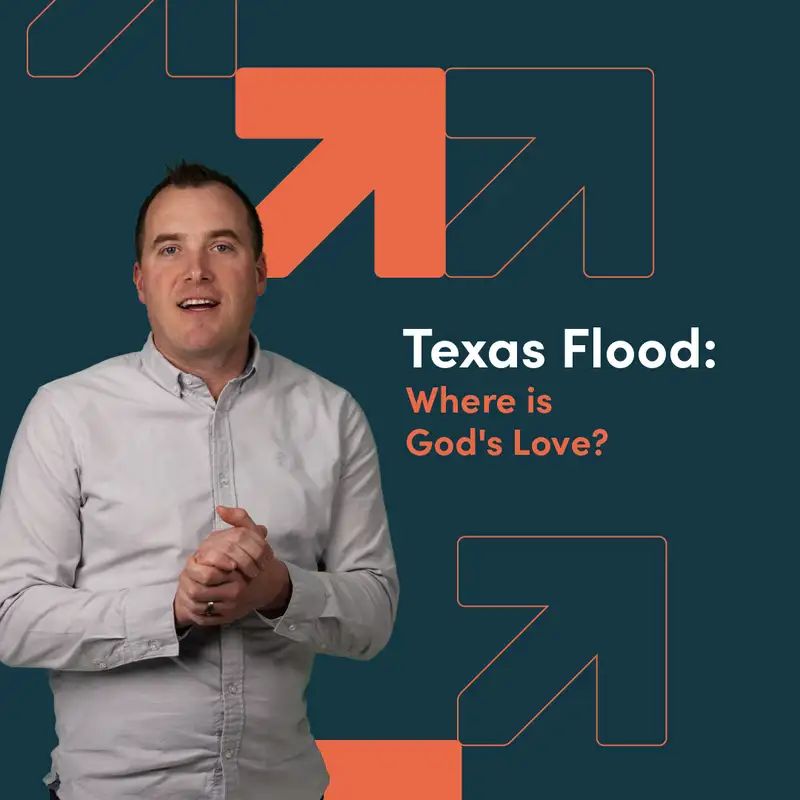Texas Flood: Where is God's Love?
Hello, everyone. Thanks for listening to Wake Up, Look Up, a podcast where we connect events happening in real time to the gospel of Jesus Christ. I'm Zach Weihrauch.
In today's episode, we're talking about the Texas flood, and we're asking the question, where is God's love?
I'm sure you've been paying attention to the incredibly terrifying and terrible story about the flood in Texas that took place recently.
Over by the Guadalupe River, which rose 35 feet in seventy five minutes.
A devastating flood that isn't just massive in scale, but came on so quickly that people really couldn't be prepared.
As of the time of this recording, over a 100 people are now believed to be dead, and there have been some awful stories.
I read a story about a dad who punched out the window of his trailer so that his wife and children and parents could make it out, but in punching out the window against the pressure, cut himself and died as a result of his injuries.
I read a story about a mom and dad staying at the family cabin just a little up from the river where the grandparents were with their two daughters.
And when they woke up at 3:00 in the morning, there was four feet of water in their cabin.
They went to the kayaks to try to get to grandma and grandpa, and the daughters couldn't make it.
Got a text from their daughters, "we love you," only to now know their daughters and parents are dead.
Terrifying and terrible stories, horrific stuff.
And maybe some of the most troubling, at least for those of us that are Christians, is the story of what happened at Camp Mystic, a Christian camp where 750 girls were staying when the storm broke out.
Now at present recording, 27 of those girls and counselors are believed to be dead.
It begs some pretty obvious questions.
Right?
Like, why did this happen?
Where was God?
Why didn't he stop it?
750 families sent their daughters to a camp to get closer to God.
And the consequence of that fateful decision is that at least for 27 of those families, their daughter is dead.
How do we make sense of this?
How do we make sense of God, especially as Christians who believe and hold onto and teach a message of love, a God who cares, a God who's involved, a God who is able.
Where was he and where was his love when something like this happened?
Well, first, let me start with this.
That's a totally fair question.
I mean, it doesn't even matter if I say that because in some sense, that's a very guttural and human question.
You're going to ask it.
I'm going to ask it, but the Bible actually asks it.
Time and time again in the Bible in situations like this, someone—oftentimes the central character, oftentimes the person who has the closest relationship with God—is the one asking God, "Where were you?"
"Why didn't you do something?"
"Couldn't you have stopped this?"
I want you to understand a really important principle.
The Bible tells us that wrestling with questions about God's love is not what you do when you don't have faith.
It's what you do when you do have faith.
The whole point of the tension is, "God, I've come to believe some pretty incredible things about you."
"I've come to believe that you're a pretty incredible God who loves me," which begs the question, "Why did you let this happen?"
Understand that the tension point of your heart is that God has shown himself to be loving.
And while the Bible legitimizes that question and even in many ways invites us to ask it, it never promises us answers to that exact question in that exact moment.
Instead, the Bible offers us a different kind of solution.
Not that when we go to God in the midst of every earthquake or every famine or every flood that we will get an exact answer, but rather that God has given us a fixed place to look, to answer the question of whether or not he's loving and whether or not he can be trusted—and that place is Jesus.
The apostle Paul says in Romans 5:8 that God shows his love in this way: that while we were yet sinners, Christ died for us.
The epicenter of God's love is not in the minute-by-minute accounting of what he does or does not do.
To make sense of what God is doing, we would have to zoom out so far to see all the ripple effects of any one thing that happens.
We're never going to have that ability.
We're not God.
But we do have a fixed place to look in the coming and living and dying and raising of God's own son.
Jesus, who came to earth and became a sufferer, became a struggler.
Jesus, who on the cross asked the very same question you and I are asking right now:
"My God, my God, why have you forsaken me?"
If you're wondering where God's love is in the midst of the flood in Texas, the answer is where it's always been—demonstrated in the life, death, and resurrection of Jesus.
And I understand at times that might feel thin, but consider this: of all the world's religions, only Christianity gives you that fixed point.
Only Christianity is God offering tangible evidence that he is loving.
And in the midst of that evidence, saying, "Come to me with all the questions you have that you can't seem to figure out in light of that truth in what's happening in your world."
And in the meantime, as we wrestle with those theological questions, our hearts should be breaking, as I believe the heart of God is breaking for those families in Texas.
Let's lift them up in prayer and look forward to the day where there will be no more flooding.
There will be no more death and only life and joy and love forever.
Hey, thanks for watching this episode of Wake Up, Look Up.
If you enjoyed it, please help us get the word out by sharing it with someone you think might benefit from it.
And while you're here, make sure to subscribe to our YouTube channel to get further content or even download the CCC app, where you'll find even more resources to help you grow in your faith and relationship with Jesus Christ.
Have an article you’d like Pastor Zach to discuss? Email us at wakeup@ccchapel.com!
Creators and Guests


